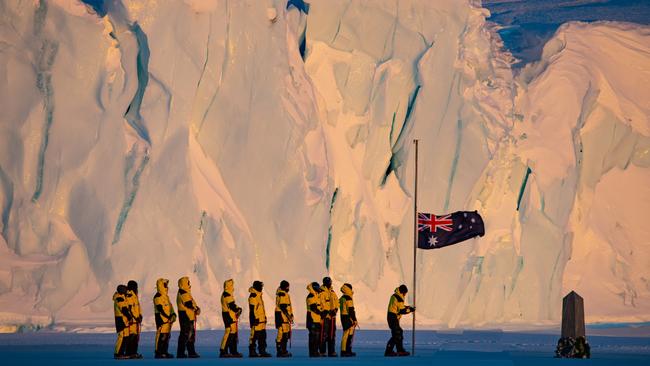Canberra shouldn’t use Covid-19 as an excuse to ignore competition for Antarctica


Canberra is coming from a position of weaknesses in the Antarctic game. Australian Antarctic interests — heralded by a 42 per cent territorial claim — are now executed by a skeleton staff, (further) limited financial resources and a sole icebreaker plagued by delays over in a Romanian shipyard. Our Antarctic strategic challenge predates coronavirus, with some sources of strain long apparent.
The pandemic is merely being used to obfuscate Australia’s dismal Antarctic capabilities. A simple COVID-19 test prior to leaving for an expedition departure would surely ensure we are not introducing the virus to the continent.
The US has done this. Why can’t we?
Instead, those left behind by Australia are forced to endure a second winter in that challenging environment.
Recently, the Australian Antarctic Division unveiled its new motto: “Valued, protected, understood.” The scaling back of activities due to coronavirus has illustrated how our Antarctic priority is too narrowly focused on scientific understanding of the continent. The basic operational implications posed by coronavirus indicate an overall inability to protect the continent as geopolitical competition intensifies.
It all leaves us questioning the real value we are assigning to our Antarctic stake. The coronavirus hiccup is a wake-up call, an opportunity for the government to substantially increase funding and operational capabilities so that skeleton staffing and rented icebreakers are no longer the default-mode for our Antarctic strategy.
The principle source of strain is the reality that the Antarctic Treaty is no longer fit for purpose. The Antarctic Treaty was the best viable solution to challenges of the 1960s, but its key assumptions don’t reflect today’s strategic realities.
First and foremost, the treaty assumes unwavering commitment to international law by its signatories. We know well the tendency of signatories such as China, Russia, and even the US to interpret international law in rather creative ways, just look at the South China Sea. And signatories are well versed with the grey zone of the Antarctic Treaty. The treaty bans militarisation on the continent, yet military personnel and equipment are deemed permissible if deployed in “support of scientific research”.
Further, the treaty did not account for dual-use technology. But signatories are capitalising on technological advancements, with most activity serving “dual-use” purposes. China has deployed its Ice Pathfinder satellite which has now mapped the Antarctic down to 70m visibility. Beijing has eyes on the entire continent, and we are yet to access the satellite’s “scientific” findings — despite the treaty stipulating all research data is to be shared.
And there are implicit tensions in the US-Australia alliance, with our greatest mate refusing to acknowledge Australia’s Antarctic claim. US Operation Deepfreeze is under way, with Washington airlifting 120 personnel from Christchurch to its McMurdo Antarctic base. Meanwhile, Australian Antarctic expeditioners and personnel have been halved.
With great power competition intensifying in Antarctica, Donald Trump has revived US polar strategy — underscoring Washington’s irrefutable Antarctic strategic interests while calling out Chinese and Russian polar exceptionalism. In the past decade, China has developed an icebreaker building capability and set up camp in the AAT and attempted to secure the Dome Argus (the highest point of the Antarctic ice-sheet) close to the clearest point on Earth for space satellites.
Krill resources and the vast mineral and energy wealth of the Antarctic are attractive to Beijing. As for the flimsy nature of the treaty, resource exploration for scientific reasons is permissible. One must question what real power Australia will have, when undoubtably, exploration becomes exploitation. Footprints are growing too. Russia is pushing ahead with plans to redevelop Vostok station and China is developing its fifth station.
The complete ramifications of coronavirus on international Antarctic endeavours will not be known for some time. For now, it has stalled crucial climate change research programs, slowed training of the next generation of scientists and stifled critical international summits, including the cancellation of the pivotal Antarctic Treaty Consultative Meeting.
For now, it is clear coronavirus has further exposed Canberra’s lax Antarctic agenda. Australia’s Antarctic interest has been systemically underfunded and under-resourced for years. For any real chance at maintaining our Antarctic identity into the next 60 years, Australia’s Antarctic strategy needs some serious rehab.
Elizabeth Buchanan is a lecturer in strategic studies with Deakin University, supporting the defence and strategic studies course at the Department of Defence’s Australian War College.



Antarctica remains the only continent free of coronavirus. But the pandemic is shaping the Antarctic security picture, nonetheless. Great power competition in the form of resurgent Russia and imperialist China has been sharpened in the Antarctic context. However, Canberra continues to defer to the Antarctic Treaty, a Cold War-era international agreement to “freeze” the problem of sovereignty of the world’s fifth largest continent, to downplay the geopolitical challenges on our southern flank. Australia’s Antarctic stake is a casualty of coronavirus and it is time to triage our national strategic interest.